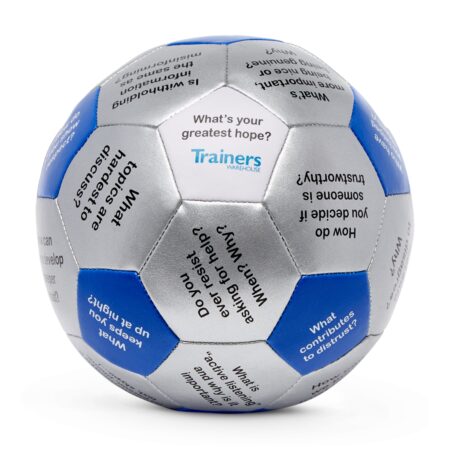Trust-Building Games & Activities
Here’s the problem with trust-building games, you don’t build trust by playing a game. You can play any number of blindfold games, trust falls, or team-building games, and you’ll likely end up just where you started. Why? That’s just not how people build trusting relationships. Sorry. Not sorry. Trust is developed in an iterative loop through communication, relationship building, and sharing vulnerability. While this might happen in a very well-structured game, I wouldn’t count on it. Instead, focus on how to have conversations that will build relationships and foster trust.
How to Get Started?
First, ditch the trust-building game.
Mind your Ps and Qs during Trust-Building Conversations
While there’s no single right answer about where, when, or how you have these conversations, these guidelines will help. If you plan to have a “mighty” conversation, be sure to mind your Ps and Qs:
Private-ish: Respect that deeper conversations might be more welcome in a smaller, more private setting. Find a place that’s free from distractions.
Pause: Don’t expect to dive right into the deepest topic on your list. Ease into it and build slowly to more thoughtful questions. Give participants time to consider their responses before speaking or sharing.
Quiet -If participants need to yell over loud voices or music, they’re less likely to share intimate, vulnerable, or insightful thoughts and reflections.
Questions: Ask respectful questions that enable those answering to share only what’s comfortable, not feeling put on the spot. Appreciate power dynamics, employer/employee relationships, and other factors that might inhibit full sharing.
Quality, not quickness: Don’t rush through important conversations. Be sure you have enough time to confirm understanding, avoid misconceptions, and share empathy.
Pick a Process
Feel free to have a freestyle conversation. However, you can also spice it up and make it fun with conversation starter tools like Thumballs and Conversation Decks–each of which will feel like a custom-made trust-building game! An advantage of a Thumball is it brings a sense of fun to otherwise serious topics. Balls also make the experience more physical, engaging the mind and body. Card decks, similarly, create a fun and more physical experience. The randomness of questions can also make the experience of deep conversations less off-putting. Cards with images can also lend themselves to creative thinking, metaphorical responses, and unanticipated stories.

Question Topics that Build Trust
With a bit of practice, you’ll find it easier than you think to avoid conversations about the weather, favorite foods, how busy you are, or the traffic on the freeway. The following 9 topics are key to developing deeper, more meaningful, and more trusting relationships. Moreover, you can delve into the topics in ways that don’t feel inappropriate or intrusive. Rather, they open people up to reflection and sharing:
- Past experiences – how have your upbringing and history shaped who you are today
- Happiness – the places, things, or activities that bring happiness
- Accomplishments – what you’ve done that’s made you feel proud.
- Goals – identify those that inspire you and those you have yet to tackle
- Frustration – the challenges and obstacles that create frustration
- Causes – which causes are worth fighting for, or investing in
- Honesty – when it’s appropriate to bend the truth; the impact of dishonesty
- Values – discuss which values most drive you (this can be fun and easy with the help of a values card deck)
- People – who are the people who guide you, ground you, lead you, and have your back
If you prefer to use a team-building or trust-building game–like Pipelines, TeamWriter, Square Rope, Trust Falls–prior to launching into the “real” conversations that build trust, carefully consider your debriefing questions. In any game, true learning comes from the discussion after the game. So, try to tie your debrief questions to some of the above themes.
Making it Fun
I think facilitators are drawn to trust-building games because they appreciate that fun experiences help break down barriers, reduce stress, foster friendship, and make players more open to sharing. While all this is true, developing deep, trusting relationships is hard work, which requires people to be vulnerable with one another. Vulnerability often feels inappropriate if you’re at work, leading a team, or projecting an image of power, capability, and self-control. Counter-intuitively, sharing vulnerability and building trust with others makes leaders and managers better at what they do.
Read More on Building Trust
From Team Bonding to Team Building
Building Relationships through Shared Vulnerability
Building Relationships Through Better Communication

